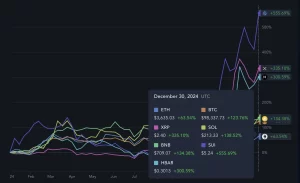As we enter 2025, Ethereum (ETH) faces growing uncertainty despite its long-standing dominance in the smart contract space. While ETH posted solid gains in 2024, it trailed behind major competitors like Solana, XRP, and SUI, raising concerns about its future as the leading smart contract platform.
The Ethereum Foundation also had a difficult year, dealing with transparency issues, leadership changes, and increasing skepticism from the community. With divided opinions among experts, the question remains: Does Ethereum still offer strong investment potential, or are alternative ecosystems more attractive?
Ethereum Lags Behind Competitors
In 2024, Ethereum gained 63%, but this was significantly lower than its competitors. Bitcoin surged by 123%, BNB rose by 134%, and Solana climbed 138%. Smaller projects like Hedera (300%), XRP (335%), and SUI (555%) posted even higher returns, indicating that capital was flowing into ecosystems that offered greater returns.
Ethereum was one of the few in this group that didn’t reach a new all-time high, with its 2024 peak barely surpassing $4,000—far from its 2021 record of $4,864.

Declining Fees and Competition
Ethereum's position in the crypto space is further challenged by competition from chains like Solana. In the past 30 days, Ethereum has seen $133 million in fees—just ahead of smaller platforms like Pumpfun ($123 million). Of the top 10 fee-generating platforms, five are Solana-based projects, including Jito, Raydium, Meteora, and Pump, which have all outpaced Ethereum in fee generation.
Ethereum Foundation Faces Criticism
The Ethereum Foundation’s troubles in 2024 contributed to the growing unease around ETH. Key members took advisory roles at EigenLayer, a project built on Ethereum, which raised concerns about conflicts of interest. Additionally, the foundation was criticized for a lack of transparency, especially following a $100 million transfer to Kraken and rumors that it had been selling ETH every 11 days.
Vitalik Buterin, Ethereum's co-founder, defended the foundation's neutrality and hinted at potential changes, including a leadership restructuring to improve communication and technical expertise. Despite these moves, the community remains skeptical, with ETH down 17.5% since Buterin’s announcement.

Expert Opinions: Mixed Sentiment on Ethereum’s Future
Opinions about Ethereum’s future are mixed. Max Resnick, Lead Economist at Anza, believes Uniswap missed an opportunity by not launching on Solana, as Solana-based DEXs like Raydium now generate more volume and fees than Uniswap.
Anton Bukov, co-founder of 1Inch, takes a more optimistic view, praising Ethereum’s Layer 2 solutions for their simplicity and developer-friendly environment. Despite market uncertainty, he believes Ethereum remains the most popular platform for developers.
Crypto investor Ted Pillows points to potential catalysts for Ethereum, including the possibility of an Ethereum Staking ETF. However, Crypto data expert Kofi argues that Ethereum’s decentralized nature means it should not rely on the foundation as its figurehead. Kofi stresses that the Ethereum Foundation’s role is to support the network’s growth from behind the scenes, not to be the public face of the project.
Should You Invest in Ethereum?
Ethereum’s struggles in 2024 highlight significant challenges for the platform. While competitors like Solana, XRP, and SUI offer better scalability, lower fees, and higher returns, Ethereum continues to face criticism over transparency issues, leadership changes, and its ability to maintain its competitive edge.
If Ethereum doesn’t address these concerns quickly, it may lose its status as the go-to smart contract platform, making it a less attractive investment option in 2025.
